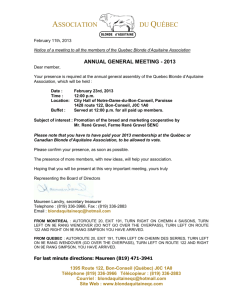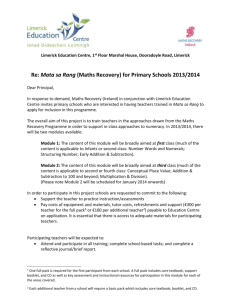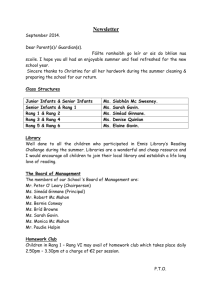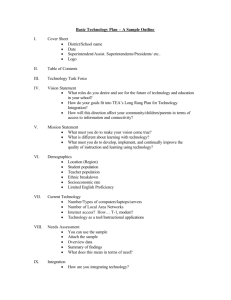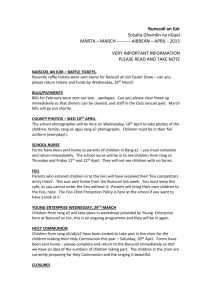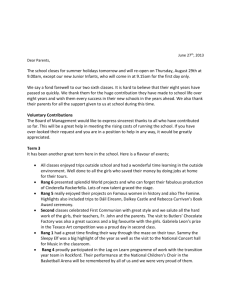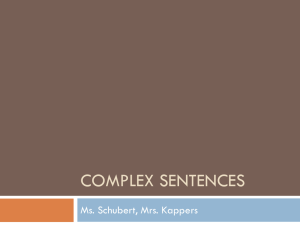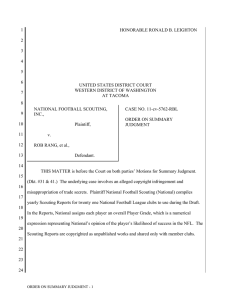Homework Policy - Coore National School
advertisement
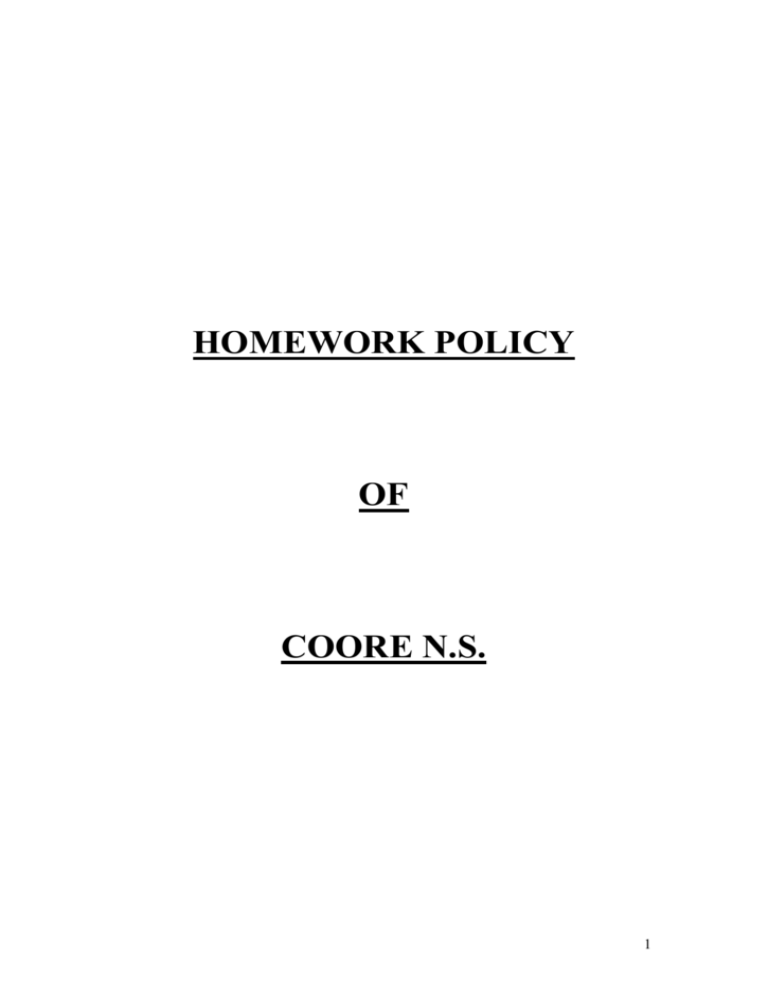
HOMEWORK POLICY OF COORE N.S. 1 Coore N.S. Mullagh, Ennis, Co. Clare. Tel: 065-7087592 Fax: 065-7087951 Email: coorenationalschool@eircom.net 1879 Homework Policy This homework policy was reviewed and amended by the teachers of Coore N.S. in September 2006 & March 2013. The original homework policy was formulated in September 2003. 2 Coore N.S. Mullagh, Ennis, Co. Clare. Tel: 065-7087592 Fax: 065-7087951 Email: coorenationalschool@eircom.net 1879 Homework Policy Relationship to Ethos of School: Coore N.S. seeks to enable each child to develop his/her potential in a Christian, caring environment. Homework encourages pupils to work independently and take responsibility for their assignments. Aims: To consolidate the daily work done in the school. To benefit pupil learning. To develop study skills. To allow the child to work independently. To give feedback to the teacher. To provide a link between teacher and parent. To develop a child’s concentration skills and develop a work ethic. To prepare children for the heavier burden of homework in post primary school. To allow children to develop research skills by using the public or school library. Homework is meant to be achievable by a child. It is normally prepared by the teacher in class. However, sometimes in Senior classes, some homework is designed to challenge children’s ability and provide opportunities for creativity. Children are expected to do their homework to the best of their individual ability – no more, no less. How often is homework given? Homework is given on Mondays, Tuesday, Wednesdays, Thursdays but not Friday – There are two exceptions: (a) If homework has been neglected during the week. (b) In senior classes some project work is undertaken at weekends. The amount of work given is always at the discretion of the class teacher. Children are given “homework off” at various times as a treat, to mark a special occasion or to acknowledge a special happening in the school calendar. Please note that extra homework may sometimes be given if work is neglected during the week, or if a suitable effort has not been made or has presented careless and untidy work. If homework is undone the class teacher shall write a signed note in the homework journal to that effect. That note is to be countersigned by a parent that night. 3 What is the contents of homework? Ideally homework will contain a balance between reading tasks, learning tasks and written tasks. This balance is not always possible and can vary considerable from day to day. However, it should be noted that time devoted to reading and learning is as important as written work. Homework will regularly contain reading, spellings, tables, written work, pieces to be learned, art, project work, research and completion of work begun in class. Children often feel that reading and “learning by heart” is not real homework. Parents can play an important role by listening to reading and items to be learned ensuring work is well done. How much time should be given to homework? The following are guidelines for time spent at homework. Individual children will complete the same homework at varying lengths of time. Time spent may vary from day to day. It is important to remember that it is the quality not the quantity of homework that matters. The following are general guidelines only: Junior Infants Senior Infants Rang 1 Rang 2 Rang 3 Rang 4 Rang 5 Rang 6 - up to 20 minutes up to 20 minutes up to 40 minutes up to 50 minutes up to 1 hour up to 1 hour & 30 minutes up to 1 hour & 30 minutes up to 1 hour & 30 minutes Children in middle and senior classes may be required to work independently on projects or research at various times. How much help should parents give? Parents can help their children with their homework by: Providing them with a suitable place and time to do homework. Preventing distractions and interruptions while they are doing their homework, e.g. other children, T.V. So your child gets maximum benefit from their homework, parents are asked to: Check the correct homework is done. Check that written homework is done neatly and carefully. Examine tables and spellings nightly. Children should do written work themselves and parents should only help if a child has difficulty. If a child has difficulty, the parent should help the child to overcome this difficulty with further explanation or examples, but not by doing the actual homework. In this instance the parent should inform the teacher of the difficulty. Shared reading is not homework in the regular sense. It is meant to be an enjoyable experience between parent and child. If it is not enjoyable shared reading should not be done. 4 Note: Ensure that your child has the correct books and copies in their bags each day. Because of the growing problem of the weight of school bags, text books and copies not required for homework may be left in school. How often should parents monitor homework? Parents should check that the correct homework is complete and then sign the homework journal nightly. Ideally all written messages to the teacher should be put in the child’s journal. Please check that your child records homework neatly on correct page and ticks each item as task is completed. Notes and letters from school are issued occasionally. Please check your child’s journal for such letters on a regular basis. How often do teachers monitor homework? Ideally teachers like to check homework on a daily basis. However, it is not always possible to check each child’s journal each day. As older children learn to work independently, some items are checked less often, e.g. once a week. Some items of class work and homework may be checked by children themselves, under the direction of the teacher. This can be a very useful part of the learning process for children. When should parents communicate with the teacher about homework? When your child cannot do homework due to family circumstances. When your child cannot do homework because he/she does not understand some aspect. If the time spent at homework is often much longer than the recommended time. When should homework be done? Each family situation is different – both parents working, child minders etc., ideally homework should be done before any television is watched, soon after school, while the subject is still fresh in the child’s mind. However some children need a break before starting homework. Homework should never be left until the morning before school. Remember! If homework is a stressful experience for child or parent something is wrong! This leads to poor learning and defeats the purpose. Should this occur on a regular basis, please contact the class teacher. Signed:______________________ ___________________ __________________ 5



